Legal Aspects of International Trade: Boeing in Australia - Report
VerifiedAdded on 2023/01/23
|11
|2666
|29
Report
AI Summary
This report provides an in-depth analysis of the legal and regulatory environment impacting The Boeing Company's operations in Australia. It begins with an overview of Boeing's industry, global and Australian employee numbers. The core of the report examines the legislative regulatory framework, including the Fair Work Act 2009, taxation laws, the Corporations Act 2001 (Cth), and the Competition and Consumer Act 2010 (Cth), detailing their implications for Boeing. Furthermore, the report evaluates the impact of various treaties, conventions, and agreements, such as the double taxation treaty with the United States, the Australia – United States Free Trade Agreement (AUSFTA), the ASEAN-Australia-New Zealand Free Trade Agreement (AANZFTA), and the double taxation treaty with New Zealand, on Boeing's products and services in Australia. The report concludes by highlighting how these legal and trade factors influence Boeing's business practices and market position within the Australian context.
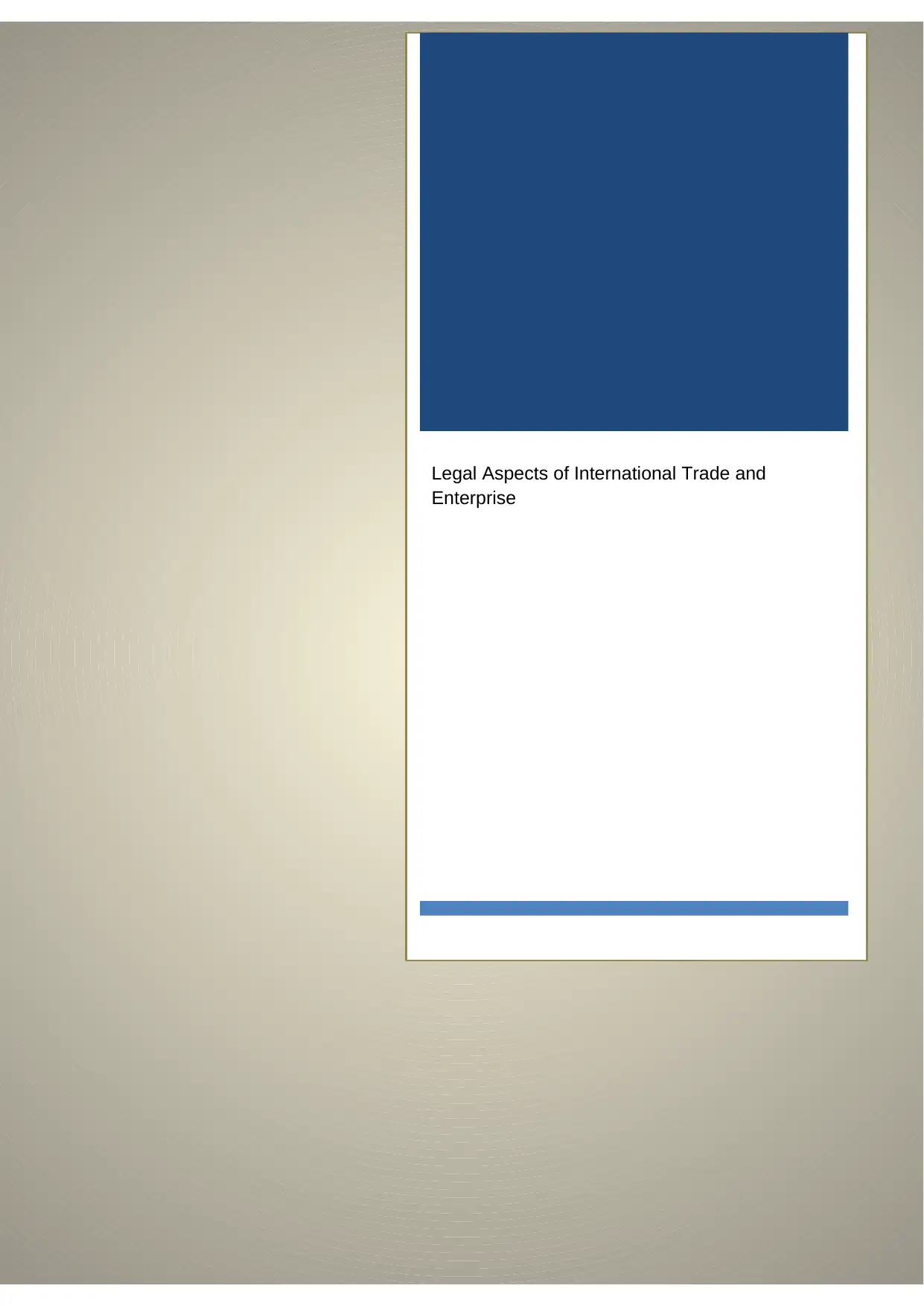
Legal Aspects of International Trade and
Enterprise
Enterprise
Paraphrase This Document
Need a fresh take? Get an instant paraphrase of this document with our AI Paraphraser
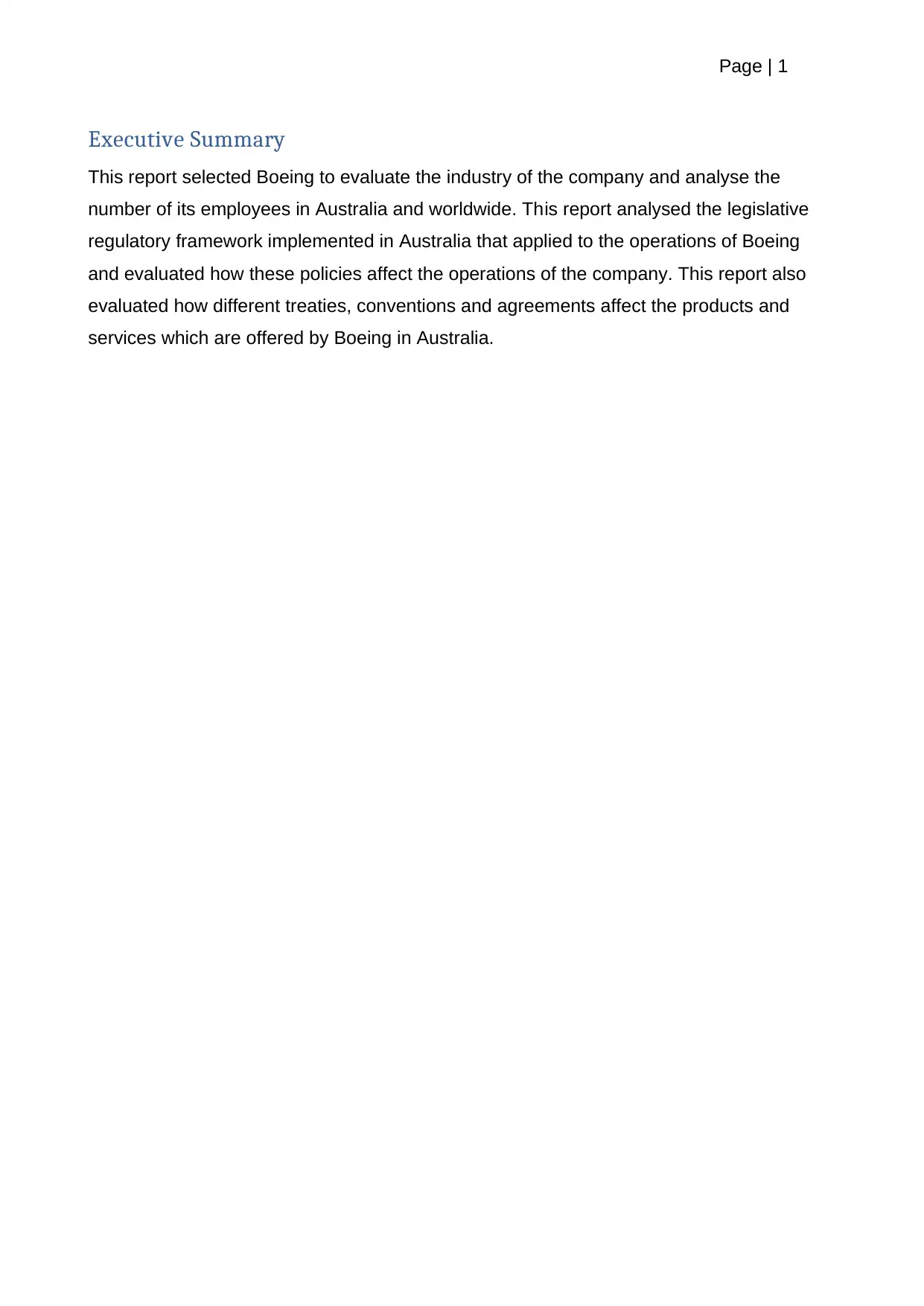
Page | 1
Executive Summary
This report selected Boeing to evaluate the industry of the company and analyse the
number of its employees in Australia and worldwide. This report analysed the legislative
regulatory framework implemented in Australia that applied to the operations of Boeing
and evaluated how these policies affect the operations of the company. This report also
evaluated how different treaties, conventions and agreements affect the products and
services which are offered by Boeing in Australia.
Executive Summary
This report selected Boeing to evaluate the industry of the company and analyse the
number of its employees in Australia and worldwide. This report analysed the legislative
regulatory framework implemented in Australia that applied to the operations of Boeing
and evaluated how these policies affect the operations of the company. This report also
evaluated how different treaties, conventions and agreements affect the products and
services which are offered by Boeing in Australia.
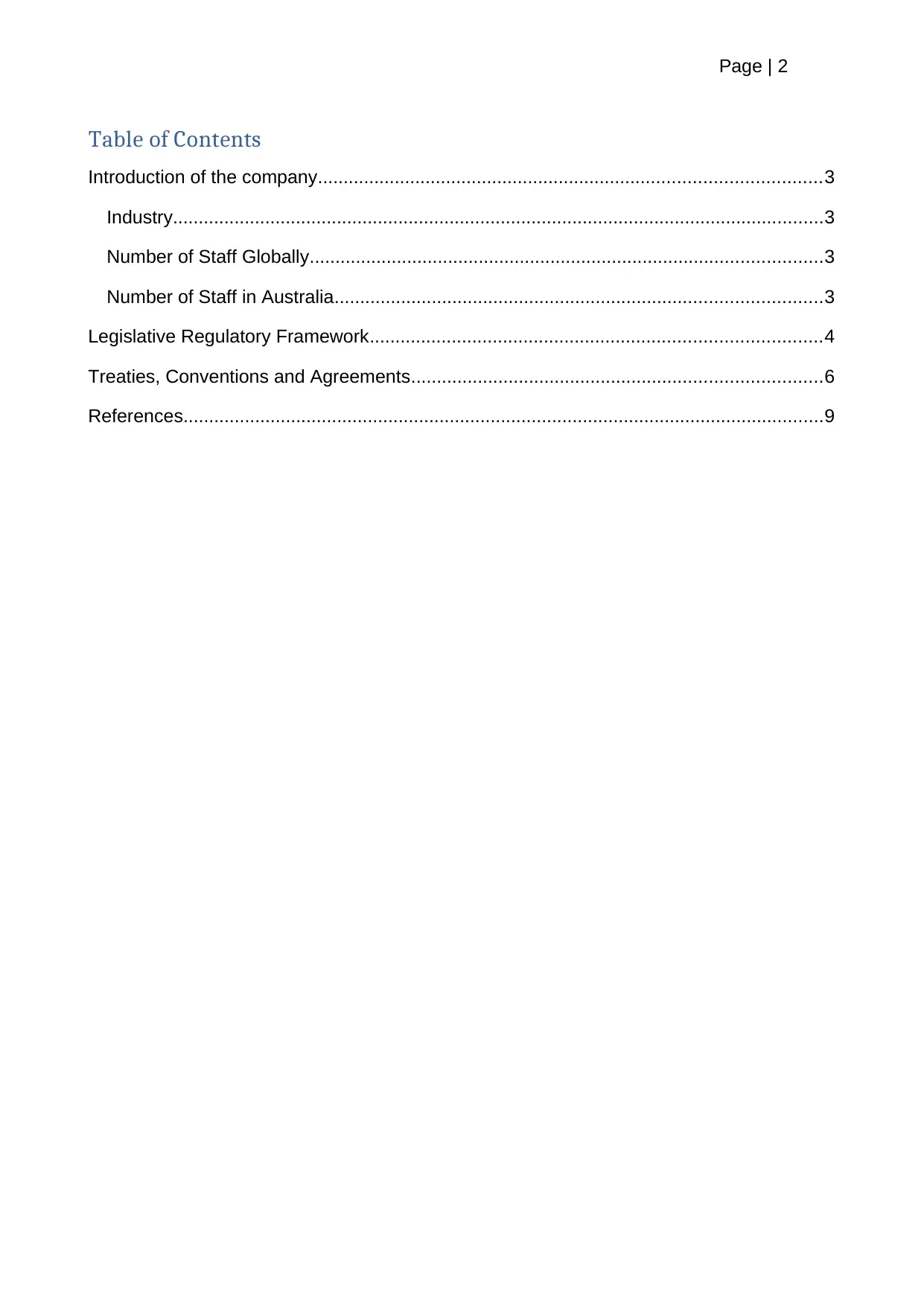
Page | 2
Table of Contents
Introduction of the company..................................................................................................3
Industry...............................................................................................................................3
Number of Staff Globally....................................................................................................3
Number of Staff in Australia...............................................................................................3
Legislative Regulatory Framework........................................................................................4
Treaties, Conventions and Agreements................................................................................6
References.............................................................................................................................9
Table of Contents
Introduction of the company..................................................................................................3
Industry...............................................................................................................................3
Number of Staff Globally....................................................................................................3
Number of Staff in Australia...............................................................................................3
Legislative Regulatory Framework........................................................................................4
Treaties, Conventions and Agreements................................................................................6
References.............................................................................................................................9
⊘ This is a preview!⊘
Do you want full access?
Subscribe today to unlock all pages.

Trusted by 1+ million students worldwide
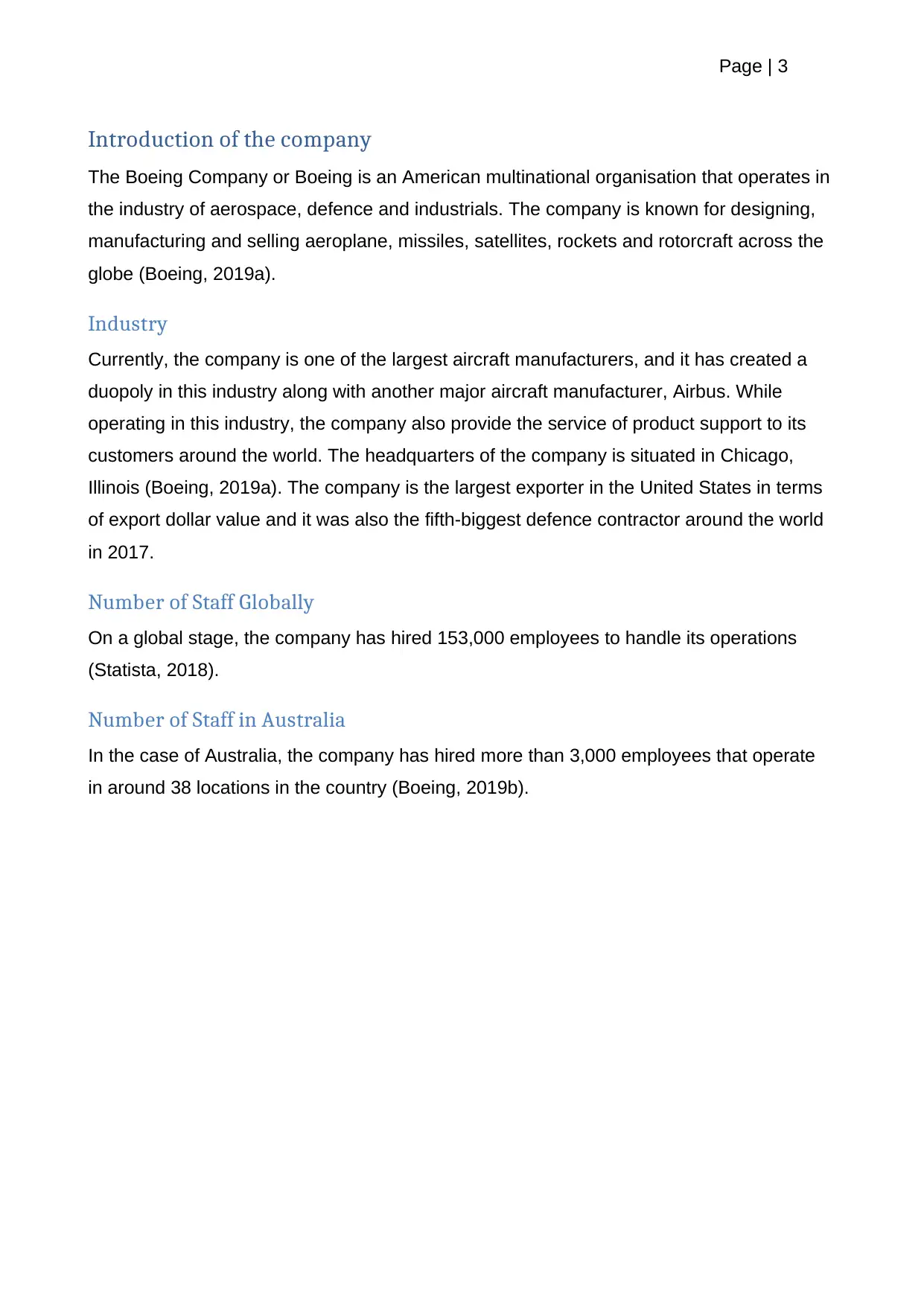
Page | 3
Introduction of the company
The Boeing Company or Boeing is an American multinational organisation that operates in
the industry of aerospace, defence and industrials. The company is known for designing,
manufacturing and selling aeroplane, missiles, satellites, rockets and rotorcraft across the
globe (Boeing, 2019a).
Industry
Currently, the company is one of the largest aircraft manufacturers, and it has created a
duopoly in this industry along with another major aircraft manufacturer, Airbus. While
operating in this industry, the company also provide the service of product support to its
customers around the world. The headquarters of the company is situated in Chicago,
Illinois (Boeing, 2019a). The company is the largest exporter in the United States in terms
of export dollar value and it was also the fifth-biggest defence contractor around the world
in 2017.
Number of Staff Globally
On a global stage, the company has hired 153,000 employees to handle its operations
(Statista, 2018).
Number of Staff in Australia
In the case of Australia, the company has hired more than 3,000 employees that operate
in around 38 locations in the country (Boeing, 2019b).
Introduction of the company
The Boeing Company or Boeing is an American multinational organisation that operates in
the industry of aerospace, defence and industrials. The company is known for designing,
manufacturing and selling aeroplane, missiles, satellites, rockets and rotorcraft across the
globe (Boeing, 2019a).
Industry
Currently, the company is one of the largest aircraft manufacturers, and it has created a
duopoly in this industry along with another major aircraft manufacturer, Airbus. While
operating in this industry, the company also provide the service of product support to its
customers around the world. The headquarters of the company is situated in Chicago,
Illinois (Boeing, 2019a). The company is the largest exporter in the United States in terms
of export dollar value and it was also the fifth-biggest defence contractor around the world
in 2017.
Number of Staff Globally
On a global stage, the company has hired 153,000 employees to handle its operations
(Statista, 2018).
Number of Staff in Australia
In the case of Australia, the company has hired more than 3,000 employees that operate
in around 38 locations in the country (Boeing, 2019b).
Paraphrase This Document
Need a fresh take? Get an instant paraphrase of this document with our AI Paraphraser
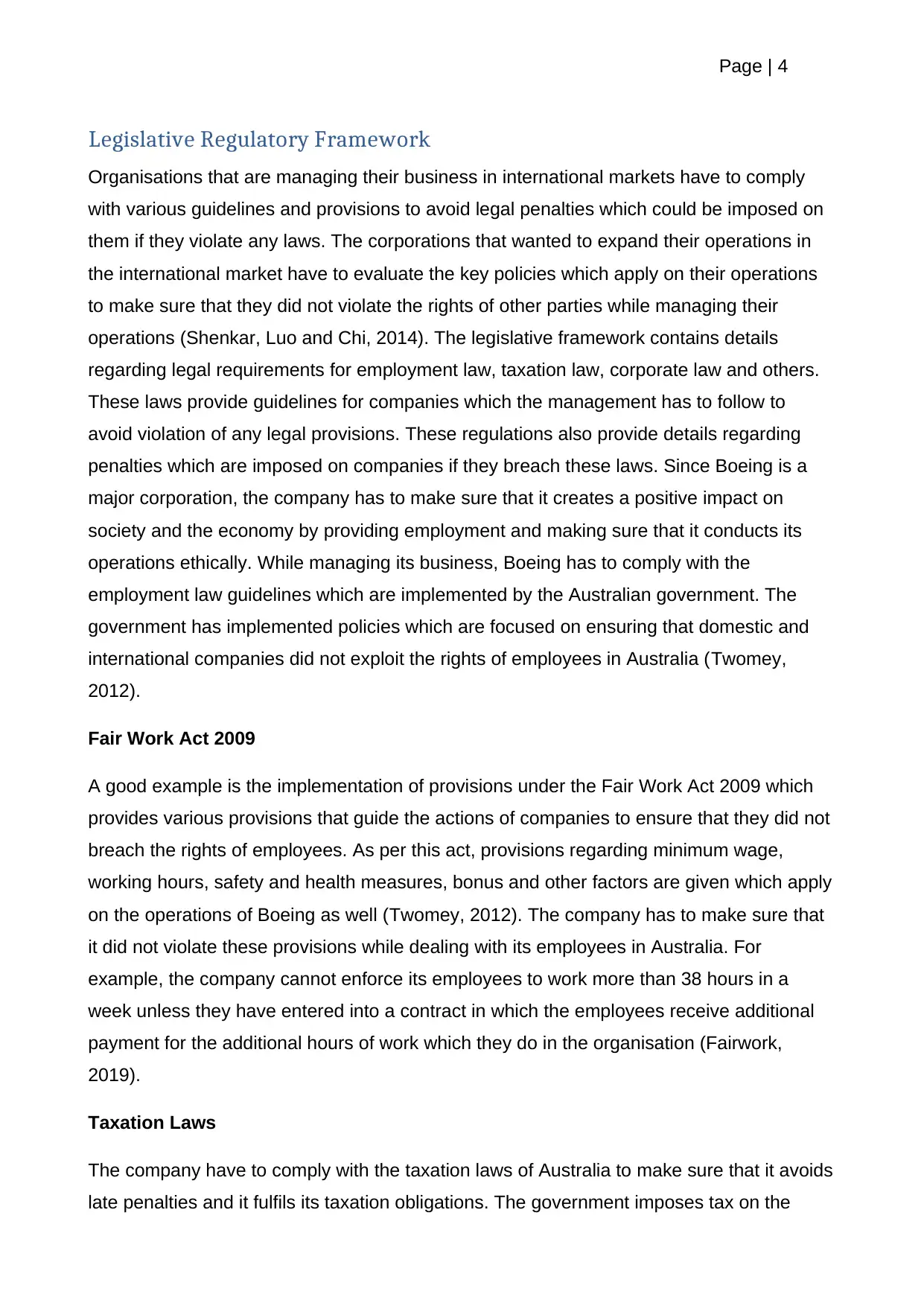
Page | 4
Legislative Regulatory Framework
Organisations that are managing their business in international markets have to comply
with various guidelines and provisions to avoid legal penalties which could be imposed on
them if they violate any laws. The corporations that wanted to expand their operations in
the international market have to evaluate the key policies which apply on their operations
to make sure that they did not violate the rights of other parties while managing their
operations (Shenkar, Luo and Chi, 2014). The legislative framework contains details
regarding legal requirements for employment law, taxation law, corporate law and others.
These laws provide guidelines for companies which the management has to follow to
avoid violation of any legal provisions. These regulations also provide details regarding
penalties which are imposed on companies if they breach these laws. Since Boeing is a
major corporation, the company has to make sure that it creates a positive impact on
society and the economy by providing employment and making sure that it conducts its
operations ethically. While managing its business, Boeing has to comply with the
employment law guidelines which are implemented by the Australian government. The
government has implemented policies which are focused on ensuring that domestic and
international companies did not exploit the rights of employees in Australia (Twomey,
2012).
Fair Work Act 2009
A good example is the implementation of provisions under the Fair Work Act 2009 which
provides various provisions that guide the actions of companies to ensure that they did not
breach the rights of employees. As per this act, provisions regarding minimum wage,
working hours, safety and health measures, bonus and other factors are given which apply
on the operations of Boeing as well (Twomey, 2012). The company has to make sure that
it did not violate these provisions while dealing with its employees in Australia. For
example, the company cannot enforce its employees to work more than 38 hours in a
week unless they have entered into a contract in which the employees receive additional
payment for the additional hours of work which they do in the organisation (Fairwork,
2019).
Taxation Laws
The company have to comply with the taxation laws of Australia to make sure that it avoids
late penalties and it fulfils its taxation obligations. The government imposes tax on the
Legislative Regulatory Framework
Organisations that are managing their business in international markets have to comply
with various guidelines and provisions to avoid legal penalties which could be imposed on
them if they violate any laws. The corporations that wanted to expand their operations in
the international market have to evaluate the key policies which apply on their operations
to make sure that they did not violate the rights of other parties while managing their
operations (Shenkar, Luo and Chi, 2014). The legislative framework contains details
regarding legal requirements for employment law, taxation law, corporate law and others.
These laws provide guidelines for companies which the management has to follow to
avoid violation of any legal provisions. These regulations also provide details regarding
penalties which are imposed on companies if they breach these laws. Since Boeing is a
major corporation, the company has to make sure that it creates a positive impact on
society and the economy by providing employment and making sure that it conducts its
operations ethically. While managing its business, Boeing has to comply with the
employment law guidelines which are implemented by the Australian government. The
government has implemented policies which are focused on ensuring that domestic and
international companies did not exploit the rights of employees in Australia (Twomey,
2012).
Fair Work Act 2009
A good example is the implementation of provisions under the Fair Work Act 2009 which
provides various provisions that guide the actions of companies to ensure that they did not
breach the rights of employees. As per this act, provisions regarding minimum wage,
working hours, safety and health measures, bonus and other factors are given which apply
on the operations of Boeing as well (Twomey, 2012). The company has to make sure that
it did not violate these provisions while dealing with its employees in Australia. For
example, the company cannot enforce its employees to work more than 38 hours in a
week unless they have entered into a contract in which the employees receive additional
payment for the additional hours of work which they do in the organisation (Fairwork,
2019).
Taxation Laws
The company have to comply with the taxation laws of Australia to make sure that it avoids
late penalties and it fulfils its taxation obligations. The government imposes tax on the
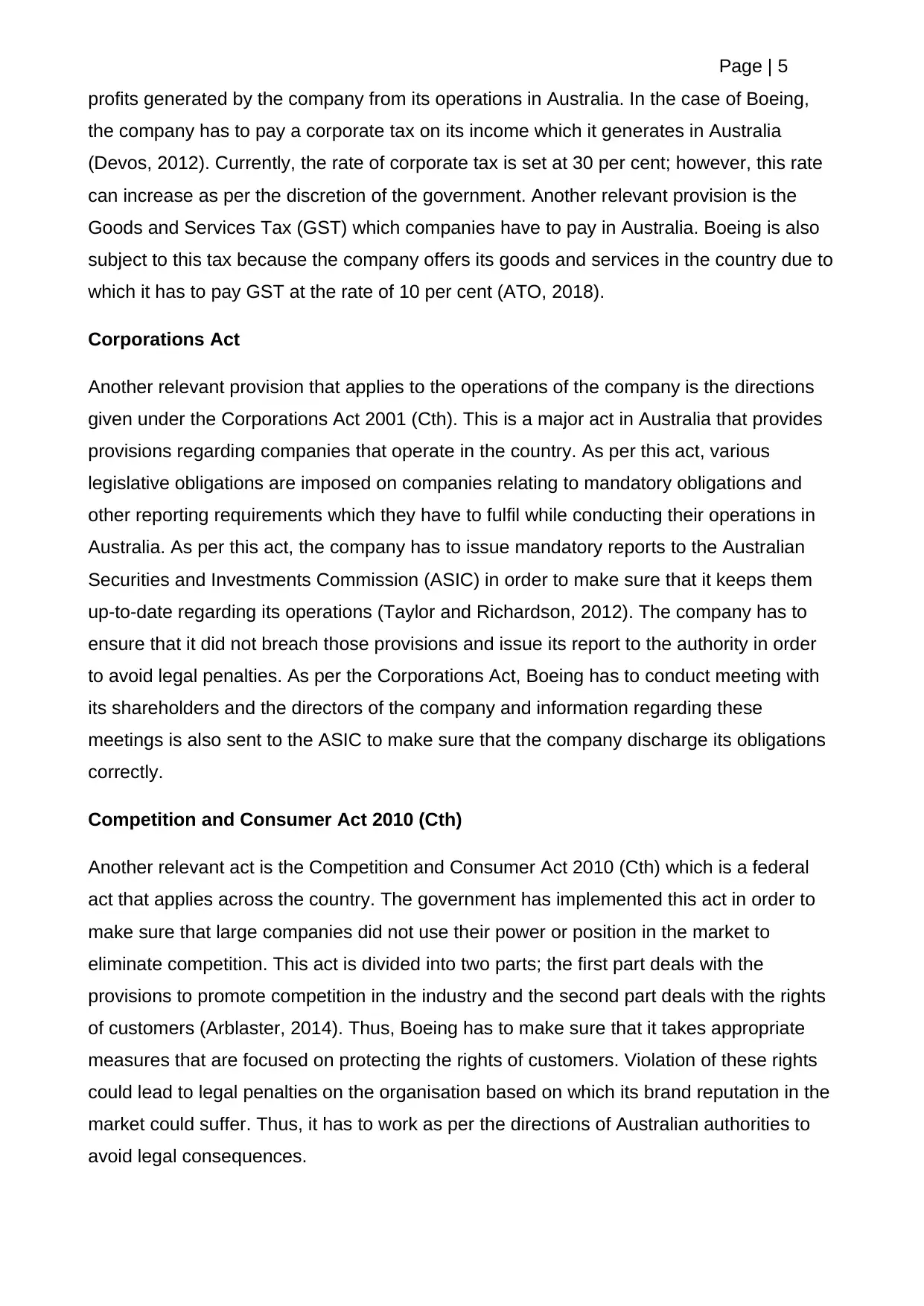
Page | 5
profits generated by the company from its operations in Australia. In the case of Boeing,
the company has to pay a corporate tax on its income which it generates in Australia
(Devos, 2012). Currently, the rate of corporate tax is set at 30 per cent; however, this rate
can increase as per the discretion of the government. Another relevant provision is the
Goods and Services Tax (GST) which companies have to pay in Australia. Boeing is also
subject to this tax because the company offers its goods and services in the country due to
which it has to pay GST at the rate of 10 per cent (ATO, 2018).
Corporations Act
Another relevant provision that applies to the operations of the company is the directions
given under the Corporations Act 2001 (Cth). This is a major act in Australia that provides
provisions regarding companies that operate in the country. As per this act, various
legislative obligations are imposed on companies relating to mandatory obligations and
other reporting requirements which they have to fulfil while conducting their operations in
Australia. As per this act, the company has to issue mandatory reports to the Australian
Securities and Investments Commission (ASIC) in order to make sure that it keeps them
up-to-date regarding its operations (Taylor and Richardson, 2012). The company has to
ensure that it did not breach those provisions and issue its report to the authority in order
to avoid legal penalties. As per the Corporations Act, Boeing has to conduct meeting with
its shareholders and the directors of the company and information regarding these
meetings is also sent to the ASIC to make sure that the company discharge its obligations
correctly.
Competition and Consumer Act 2010 (Cth)
Another relevant act is the Competition and Consumer Act 2010 (Cth) which is a federal
act that applies across the country. The government has implemented this act in order to
make sure that large companies did not use their power or position in the market to
eliminate competition. This act is divided into two parts; the first part deals with the
provisions to promote competition in the industry and the second part deals with the rights
of customers (Arblaster, 2014). Thus, Boeing has to make sure that it takes appropriate
measures that are focused on protecting the rights of customers. Violation of these rights
could lead to legal penalties on the organisation based on which its brand reputation in the
market could suffer. Thus, it has to work as per the directions of Australian authorities to
avoid legal consequences.
profits generated by the company from its operations in Australia. In the case of Boeing,
the company has to pay a corporate tax on its income which it generates in Australia
(Devos, 2012). Currently, the rate of corporate tax is set at 30 per cent; however, this rate
can increase as per the discretion of the government. Another relevant provision is the
Goods and Services Tax (GST) which companies have to pay in Australia. Boeing is also
subject to this tax because the company offers its goods and services in the country due to
which it has to pay GST at the rate of 10 per cent (ATO, 2018).
Corporations Act
Another relevant provision that applies to the operations of the company is the directions
given under the Corporations Act 2001 (Cth). This is a major act in Australia that provides
provisions regarding companies that operate in the country. As per this act, various
legislative obligations are imposed on companies relating to mandatory obligations and
other reporting requirements which they have to fulfil while conducting their operations in
Australia. As per this act, the company has to issue mandatory reports to the Australian
Securities and Investments Commission (ASIC) in order to make sure that it keeps them
up-to-date regarding its operations (Taylor and Richardson, 2012). The company has to
ensure that it did not breach those provisions and issue its report to the authority in order
to avoid legal penalties. As per the Corporations Act, Boeing has to conduct meeting with
its shareholders and the directors of the company and information regarding these
meetings is also sent to the ASIC to make sure that the company discharge its obligations
correctly.
Competition and Consumer Act 2010 (Cth)
Another relevant act is the Competition and Consumer Act 2010 (Cth) which is a federal
act that applies across the country. The government has implemented this act in order to
make sure that large companies did not use their power or position in the market to
eliminate competition. This act is divided into two parts; the first part deals with the
provisions to promote competition in the industry and the second part deals with the rights
of customers (Arblaster, 2014). Thus, Boeing has to make sure that it takes appropriate
measures that are focused on protecting the rights of customers. Violation of these rights
could lead to legal penalties on the organisation based on which its brand reputation in the
market could suffer. Thus, it has to work as per the directions of Australian authorities to
avoid legal consequences.
⊘ This is a preview!⊘
Do you want full access?
Subscribe today to unlock all pages.

Trusted by 1+ million students worldwide
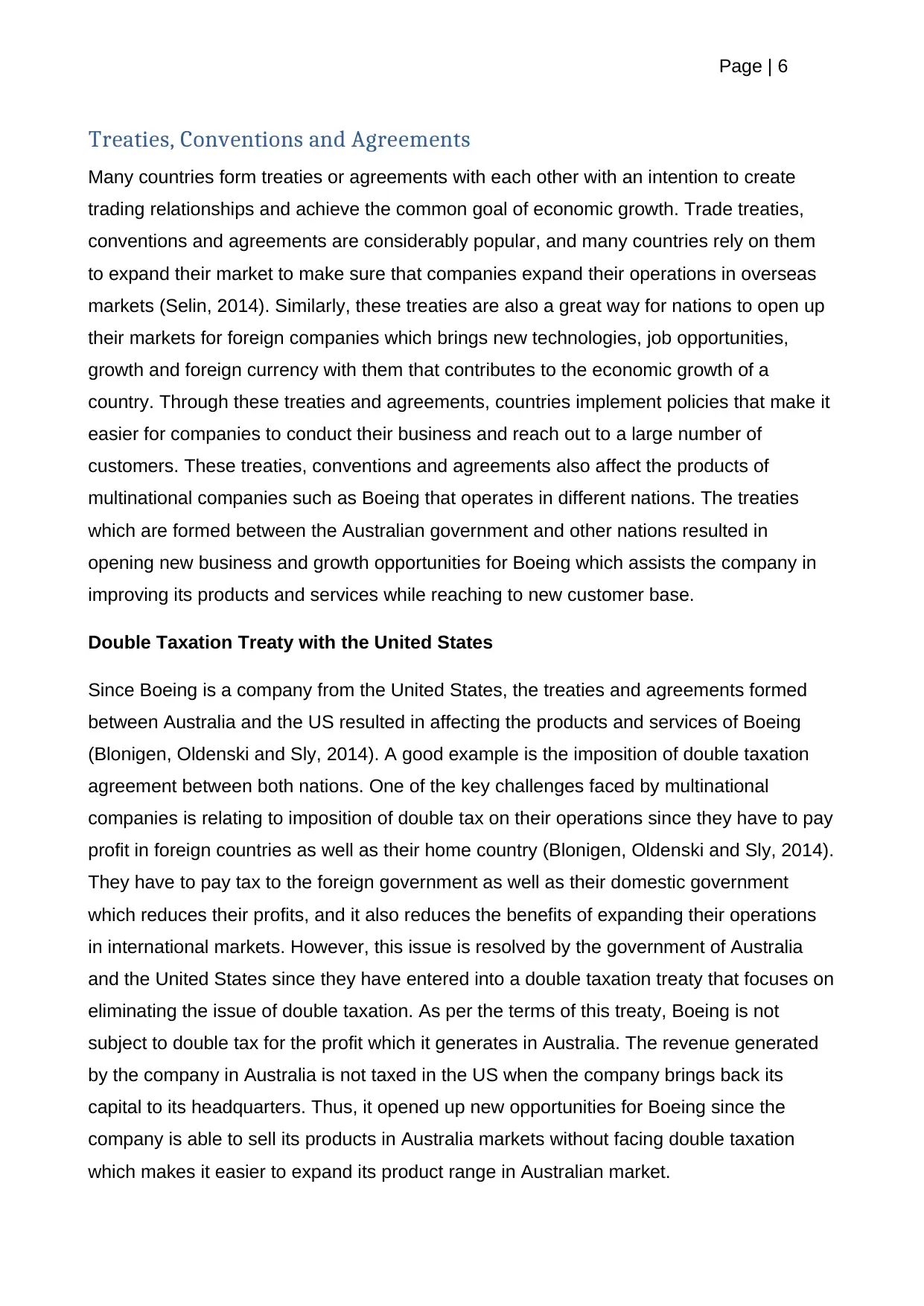
Page | 6
Treaties, Conventions and Agreements
Many countries form treaties or agreements with each other with an intention to create
trading relationships and achieve the common goal of economic growth. Trade treaties,
conventions and agreements are considerably popular, and many countries rely on them
to expand their market to make sure that companies expand their operations in overseas
markets (Selin, 2014). Similarly, these treaties are also a great way for nations to open up
their markets for foreign companies which brings new technologies, job opportunities,
growth and foreign currency with them that contributes to the economic growth of a
country. Through these treaties and agreements, countries implement policies that make it
easier for companies to conduct their business and reach out to a large number of
customers. These treaties, conventions and agreements also affect the products of
multinational companies such as Boeing that operates in different nations. The treaties
which are formed between the Australian government and other nations resulted in
opening new business and growth opportunities for Boeing which assists the company in
improving its products and services while reaching to new customer base.
Double Taxation Treaty with the United States
Since Boeing is a company from the United States, the treaties and agreements formed
between Australia and the US resulted in affecting the products and services of Boeing
(Blonigen, Oldenski and Sly, 2014). A good example is the imposition of double taxation
agreement between both nations. One of the key challenges faced by multinational
companies is relating to imposition of double tax on their operations since they have to pay
profit in foreign countries as well as their home country (Blonigen, Oldenski and Sly, 2014).
They have to pay tax to the foreign government as well as their domestic government
which reduces their profits, and it also reduces the benefits of expanding their operations
in international markets. However, this issue is resolved by the government of Australia
and the United States since they have entered into a double taxation treaty that focuses on
eliminating the issue of double taxation. As per the terms of this treaty, Boeing is not
subject to double tax for the profit which it generates in Australia. The revenue generated
by the company in Australia is not taxed in the US when the company brings back its
capital to its headquarters. Thus, it opened up new opportunities for Boeing since the
company is able to sell its products in Australia markets without facing double taxation
which makes it easier to expand its product range in Australian market.
Treaties, Conventions and Agreements
Many countries form treaties or agreements with each other with an intention to create
trading relationships and achieve the common goal of economic growth. Trade treaties,
conventions and agreements are considerably popular, and many countries rely on them
to expand their market to make sure that companies expand their operations in overseas
markets (Selin, 2014). Similarly, these treaties are also a great way for nations to open up
their markets for foreign companies which brings new technologies, job opportunities,
growth and foreign currency with them that contributes to the economic growth of a
country. Through these treaties and agreements, countries implement policies that make it
easier for companies to conduct their business and reach out to a large number of
customers. These treaties, conventions and agreements also affect the products of
multinational companies such as Boeing that operates in different nations. The treaties
which are formed between the Australian government and other nations resulted in
opening new business and growth opportunities for Boeing which assists the company in
improving its products and services while reaching to new customer base.
Double Taxation Treaty with the United States
Since Boeing is a company from the United States, the treaties and agreements formed
between Australia and the US resulted in affecting the products and services of Boeing
(Blonigen, Oldenski and Sly, 2014). A good example is the imposition of double taxation
agreement between both nations. One of the key challenges faced by multinational
companies is relating to imposition of double tax on their operations since they have to pay
profit in foreign countries as well as their home country (Blonigen, Oldenski and Sly, 2014).
They have to pay tax to the foreign government as well as their domestic government
which reduces their profits, and it also reduces the benefits of expanding their operations
in international markets. However, this issue is resolved by the government of Australia
and the United States since they have entered into a double taxation treaty that focuses on
eliminating the issue of double taxation. As per the terms of this treaty, Boeing is not
subject to double tax for the profit which it generates in Australia. The revenue generated
by the company in Australia is not taxed in the US when the company brings back its
capital to its headquarters. Thus, it opened up new opportunities for Boeing since the
company is able to sell its products in Australia markets without facing double taxation
which makes it easier to expand its product range in Australian market.
Paraphrase This Document
Need a fresh take? Get an instant paraphrase of this document with our AI Paraphraser
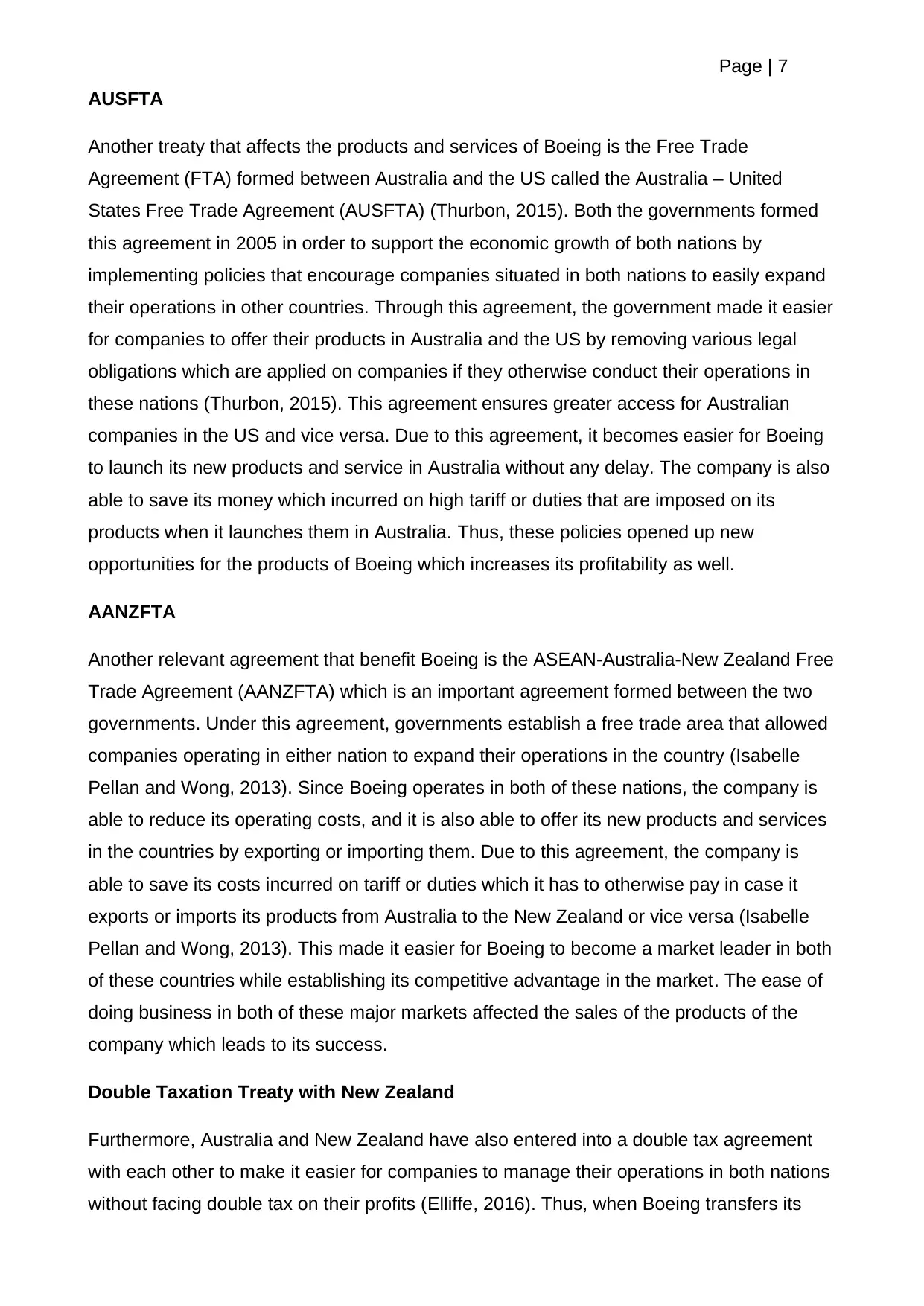
Page | 7
AUSFTA
Another treaty that affects the products and services of Boeing is the Free Trade
Agreement (FTA) formed between Australia and the US called the Australia – United
States Free Trade Agreement (AUSFTA) (Thurbon, 2015). Both the governments formed
this agreement in 2005 in order to support the economic growth of both nations by
implementing policies that encourage companies situated in both nations to easily expand
their operations in other countries. Through this agreement, the government made it easier
for companies to offer their products in Australia and the US by removing various legal
obligations which are applied on companies if they otherwise conduct their operations in
these nations (Thurbon, 2015). This agreement ensures greater access for Australian
companies in the US and vice versa. Due to this agreement, it becomes easier for Boeing
to launch its new products and service in Australia without any delay. The company is also
able to save its money which incurred on high tariff or duties that are imposed on its
products when it launches them in Australia. Thus, these policies opened up new
opportunities for the products of Boeing which increases its profitability as well.
AANZFTA
Another relevant agreement that benefit Boeing is the ASEAN-Australia-New Zealand Free
Trade Agreement (AANZFTA) which is an important agreement formed between the two
governments. Under this agreement, governments establish a free trade area that allowed
companies operating in either nation to expand their operations in the country (Isabelle
Pellan and Wong, 2013). Since Boeing operates in both of these nations, the company is
able to reduce its operating costs, and it is also able to offer its new products and services
in the countries by exporting or importing them. Due to this agreement, the company is
able to save its costs incurred on tariff or duties which it has to otherwise pay in case it
exports or imports its products from Australia to the New Zealand or vice versa (Isabelle
Pellan and Wong, 2013). This made it easier for Boeing to become a market leader in both
of these countries while establishing its competitive advantage in the market. The ease of
doing business in both of these major markets affected the sales of the products of the
company which leads to its success.
Double Taxation Treaty with New Zealand
Furthermore, Australia and New Zealand have also entered into a double tax agreement
with each other to make it easier for companies to manage their operations in both nations
without facing double tax on their profits (Elliffe, 2016). Thus, when Boeing transfers its
AUSFTA
Another treaty that affects the products and services of Boeing is the Free Trade
Agreement (FTA) formed between Australia and the US called the Australia – United
States Free Trade Agreement (AUSFTA) (Thurbon, 2015). Both the governments formed
this agreement in 2005 in order to support the economic growth of both nations by
implementing policies that encourage companies situated in both nations to easily expand
their operations in other countries. Through this agreement, the government made it easier
for companies to offer their products in Australia and the US by removing various legal
obligations which are applied on companies if they otherwise conduct their operations in
these nations (Thurbon, 2015). This agreement ensures greater access for Australian
companies in the US and vice versa. Due to this agreement, it becomes easier for Boeing
to launch its new products and service in Australia without any delay. The company is also
able to save its money which incurred on high tariff or duties that are imposed on its
products when it launches them in Australia. Thus, these policies opened up new
opportunities for the products of Boeing which increases its profitability as well.
AANZFTA
Another relevant agreement that benefit Boeing is the ASEAN-Australia-New Zealand Free
Trade Agreement (AANZFTA) which is an important agreement formed between the two
governments. Under this agreement, governments establish a free trade area that allowed
companies operating in either nation to expand their operations in the country (Isabelle
Pellan and Wong, 2013). Since Boeing operates in both of these nations, the company is
able to reduce its operating costs, and it is also able to offer its new products and services
in the countries by exporting or importing them. Due to this agreement, the company is
able to save its costs incurred on tariff or duties which it has to otherwise pay in case it
exports or imports its products from Australia to the New Zealand or vice versa (Isabelle
Pellan and Wong, 2013). This made it easier for Boeing to become a market leader in both
of these countries while establishing its competitive advantage in the market. The ease of
doing business in both of these major markets affected the sales of the products of the
company which leads to its success.
Double Taxation Treaty with New Zealand
Furthermore, Australia and New Zealand have also entered into a double tax agreement
with each other to make it easier for companies to manage their operations in both nations
without facing double tax on their profits (Elliffe, 2016). Thus, when Boeing transfers its
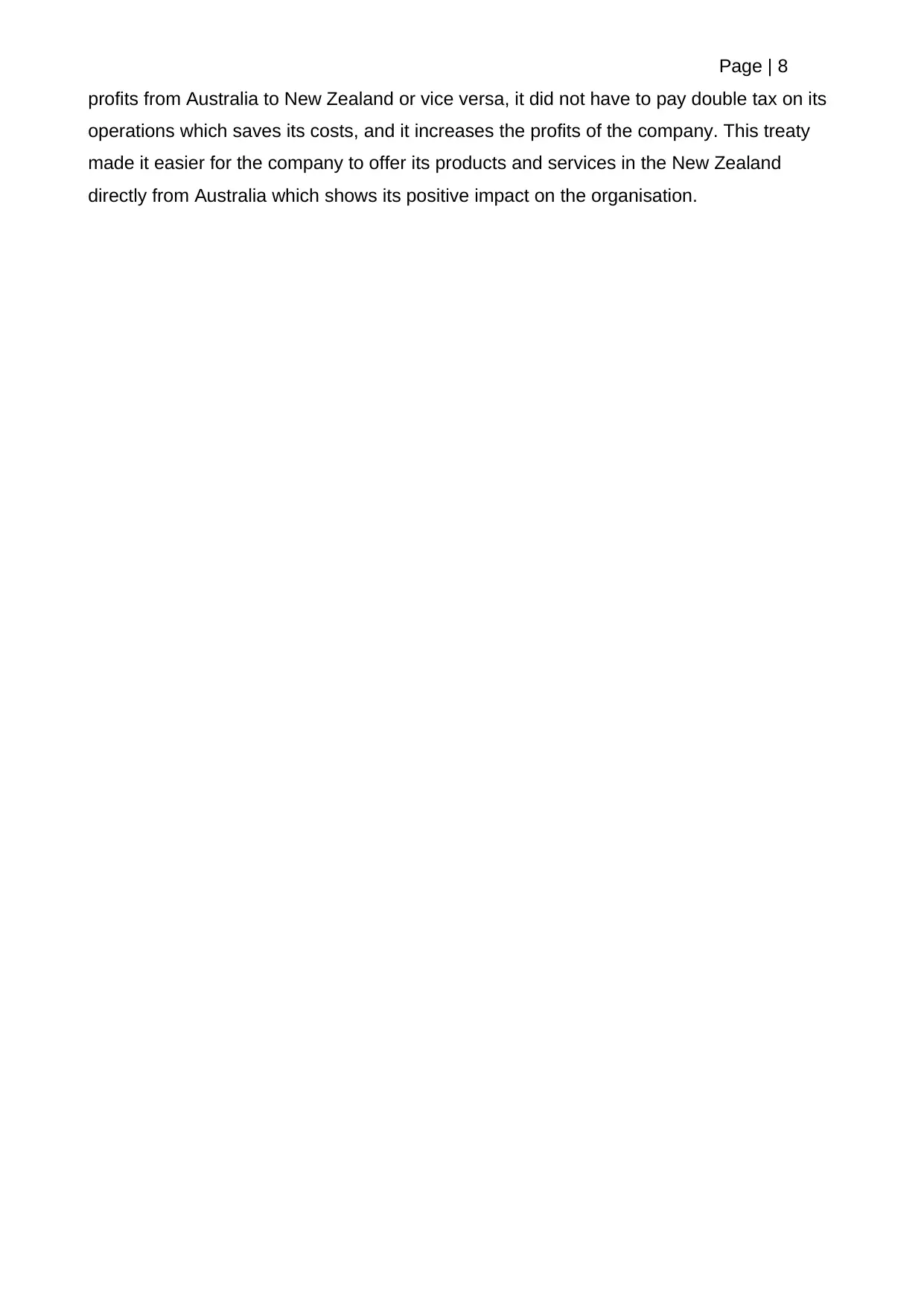
Page | 8
profits from Australia to New Zealand or vice versa, it did not have to pay double tax on its
operations which saves its costs, and it increases the profits of the company. This treaty
made it easier for the company to offer its products and services in the New Zealand
directly from Australia which shows its positive impact on the organisation.
profits from Australia to New Zealand or vice versa, it did not have to pay double tax on its
operations which saves its costs, and it increases the profits of the company. This treaty
made it easier for the company to offer its products and services in the New Zealand
directly from Australia which shows its positive impact on the organisation.
⊘ This is a preview!⊘
Do you want full access?
Subscribe today to unlock all pages.

Trusted by 1+ million students worldwide
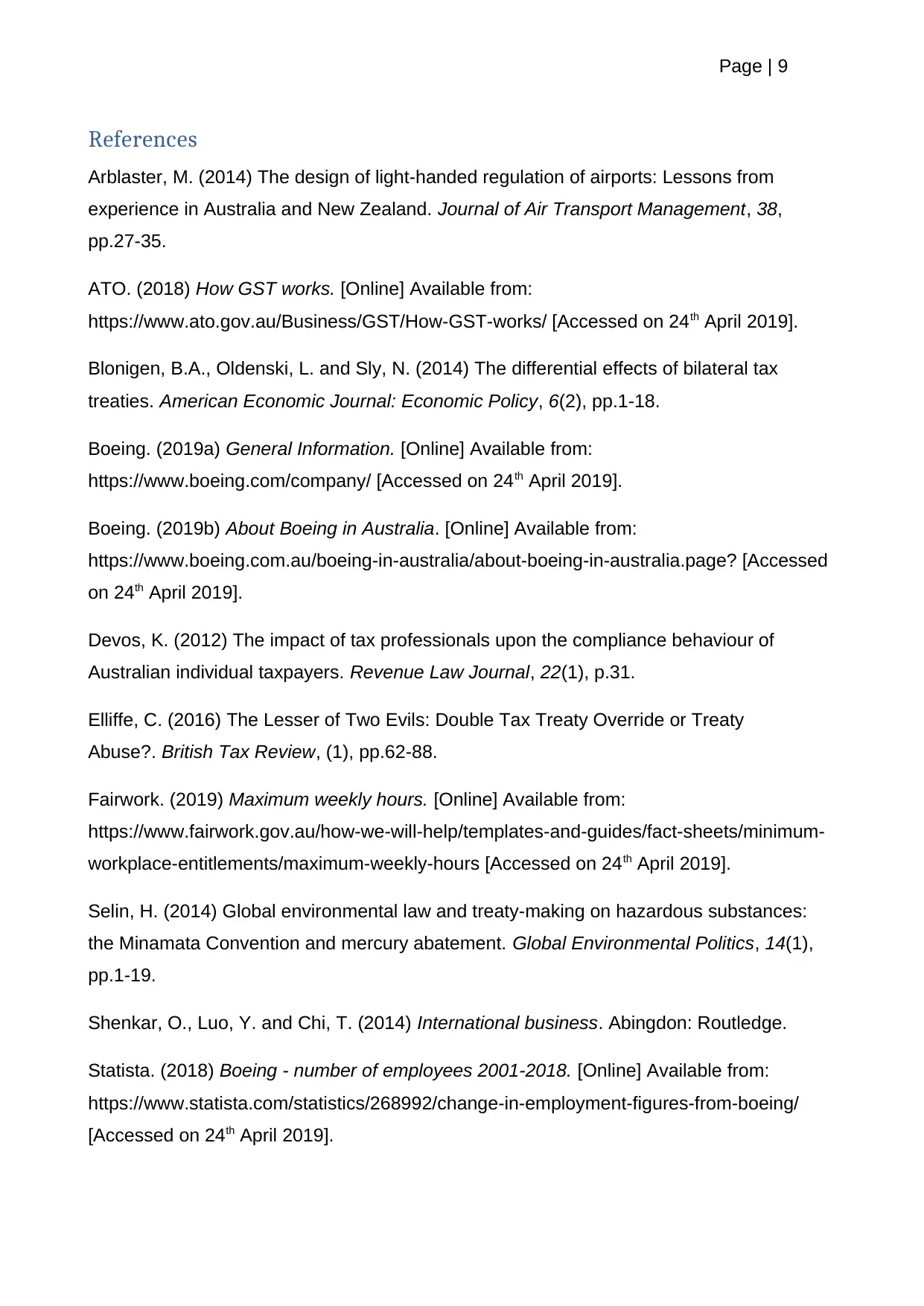
Page | 9
References
Arblaster, M. (2014) The design of light-handed regulation of airports: Lessons from
experience in Australia and New Zealand. Journal of Air Transport Management, 38,
pp.27-35.
ATO. (2018) How GST works. [Online] Available from:
https://www.ato.gov.au/Business/GST/How-GST-works/ [Accessed on 24th April 2019].
Blonigen, B.A., Oldenski, L. and Sly, N. (2014) The differential effects of bilateral tax
treaties. American Economic Journal: Economic Policy, 6(2), pp.1-18.
Boeing. (2019a) General Information. [Online] Available from:
https://www.boeing.com/company/ [Accessed on 24th April 2019].
Boeing. (2019b) About Boeing in Australia. [Online] Available from:
https://www.boeing.com.au/boeing-in-australia/about-boeing-in-australia.page? [Accessed
on 24th April 2019].
Devos, K. (2012) The impact of tax professionals upon the compliance behaviour of
Australian individual taxpayers. Revenue Law Journal, 22(1), p.31.
Elliffe, C. (2016) The Lesser of Two Evils: Double Tax Treaty Override or Treaty
Abuse?. British Tax Review, (1), pp.62-88.
Fairwork. (2019) Maximum weekly hours. [Online] Available from:
https://www.fairwork.gov.au/how-we-will-help/templates-and-guides/fact-sheets/minimum-
workplace-entitlements/maximum-weekly-hours [Accessed on 24th April 2019].
Selin, H. (2014) Global environmental law and treaty-making on hazardous substances:
the Minamata Convention and mercury abatement. Global Environmental Politics, 14(1),
pp.1-19.
Shenkar, O., Luo, Y. and Chi, T. (2014) International business. Abingdon: Routledge.
Statista. (2018) Boeing - number of employees 2001-2018. [Online] Available from:
https://www.statista.com/statistics/268992/change-in-employment-figures-from-boeing/
[Accessed on 24th April 2019].
References
Arblaster, M. (2014) The design of light-handed regulation of airports: Lessons from
experience in Australia and New Zealand. Journal of Air Transport Management, 38,
pp.27-35.
ATO. (2018) How GST works. [Online] Available from:
https://www.ato.gov.au/Business/GST/How-GST-works/ [Accessed on 24th April 2019].
Blonigen, B.A., Oldenski, L. and Sly, N. (2014) The differential effects of bilateral tax
treaties. American Economic Journal: Economic Policy, 6(2), pp.1-18.
Boeing. (2019a) General Information. [Online] Available from:
https://www.boeing.com/company/ [Accessed on 24th April 2019].
Boeing. (2019b) About Boeing in Australia. [Online] Available from:
https://www.boeing.com.au/boeing-in-australia/about-boeing-in-australia.page? [Accessed
on 24th April 2019].
Devos, K. (2012) The impact of tax professionals upon the compliance behaviour of
Australian individual taxpayers. Revenue Law Journal, 22(1), p.31.
Elliffe, C. (2016) The Lesser of Two Evils: Double Tax Treaty Override or Treaty
Abuse?. British Tax Review, (1), pp.62-88.
Fairwork. (2019) Maximum weekly hours. [Online] Available from:
https://www.fairwork.gov.au/how-we-will-help/templates-and-guides/fact-sheets/minimum-
workplace-entitlements/maximum-weekly-hours [Accessed on 24th April 2019].
Selin, H. (2014) Global environmental law and treaty-making on hazardous substances:
the Minamata Convention and mercury abatement. Global Environmental Politics, 14(1),
pp.1-19.
Shenkar, O., Luo, Y. and Chi, T. (2014) International business. Abingdon: Routledge.
Statista. (2018) Boeing - number of employees 2001-2018. [Online] Available from:
https://www.statista.com/statistics/268992/change-in-employment-figures-from-boeing/
[Accessed on 24th April 2019].
Paraphrase This Document
Need a fresh take? Get an instant paraphrase of this document with our AI Paraphraser
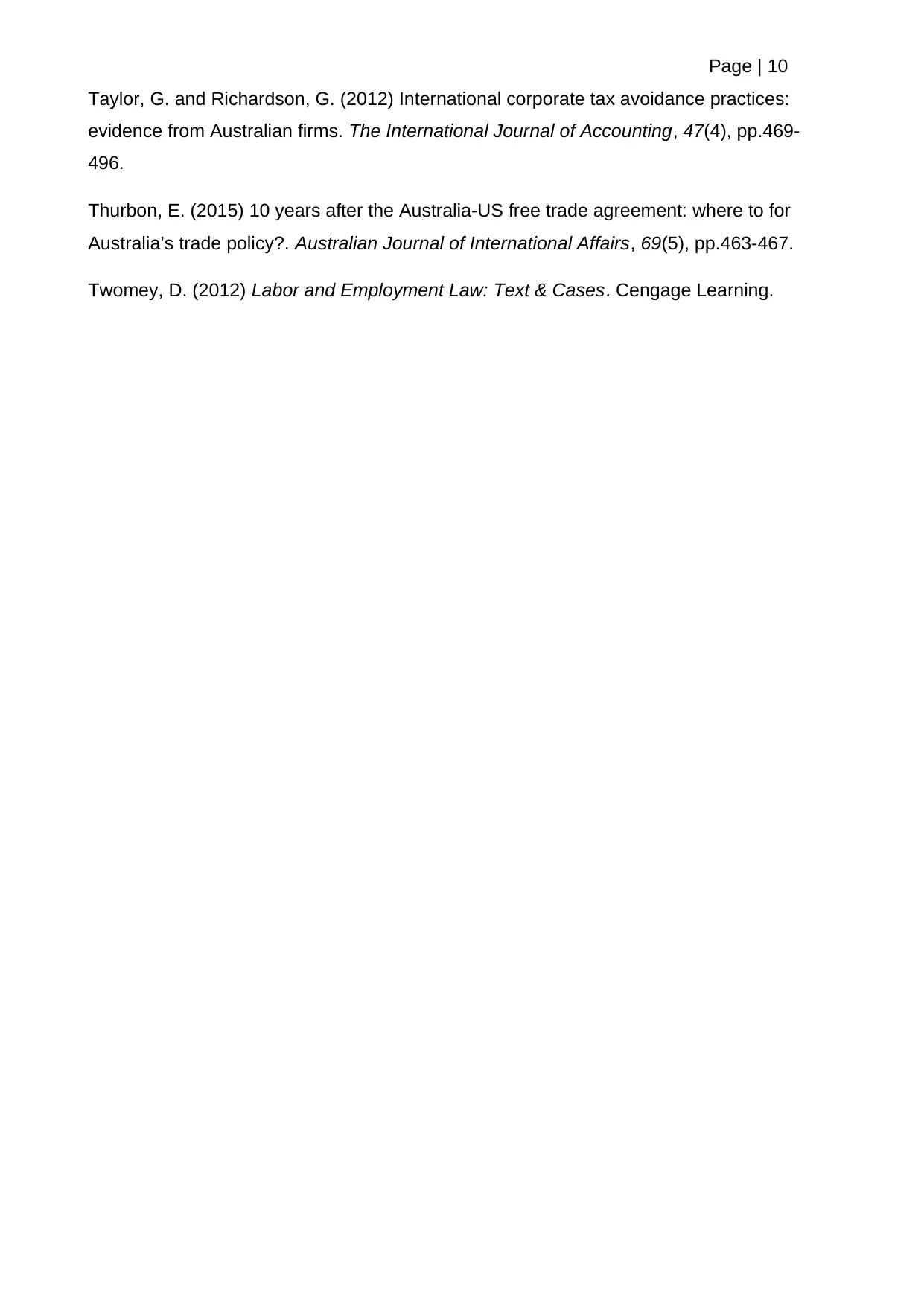
Page | 10
Taylor, G. and Richardson, G. (2012) International corporate tax avoidance practices:
evidence from Australian firms. The International Journal of Accounting, 47(4), pp.469-
496.
Thurbon, E. (2015) 10 years after the Australia-US free trade agreement: where to for
Australia’s trade policy?. Australian Journal of International Affairs, 69(5), pp.463-467.
Twomey, D. (2012) Labor and Employment Law: Text & Cases. Cengage Learning.
Taylor, G. and Richardson, G. (2012) International corporate tax avoidance practices:
evidence from Australian firms. The International Journal of Accounting, 47(4), pp.469-
496.
Thurbon, E. (2015) 10 years after the Australia-US free trade agreement: where to for
Australia’s trade policy?. Australian Journal of International Affairs, 69(5), pp.463-467.
Twomey, D. (2012) Labor and Employment Law: Text & Cases. Cengage Learning.
1 out of 11
Related Documents
Your All-in-One AI-Powered Toolkit for Academic Success.
+13062052269
info@desklib.com
Available 24*7 on WhatsApp / Email
![[object Object]](/_next/static/media/star-bottom.7253800d.svg)
Unlock your academic potential
Copyright © 2020–2026 A2Z Services. All Rights Reserved. Developed and managed by ZUCOL.





